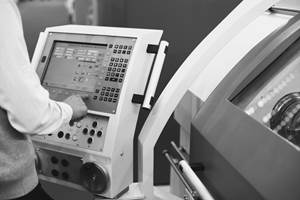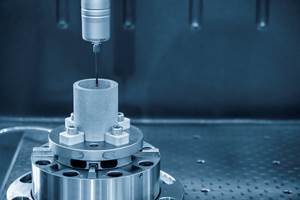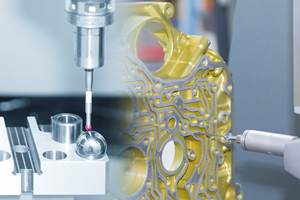Meeting Rotating Part Specs Focuses Machine Shop On Quality Inspection
It's axiomatic in the metalworking industry that for quality production, a measuring gage has to be ten times more accurate than the part it measures.
Share




It's axiomatic in the metalworking industry that for quality production, a measuring gage has to be ten times more accurate than the part it measures. "We call it a gage R&R of ten percent," says Willie Michaely, quality assurance manager of NCI, Inc. (Asheville, North Carolina) of Dowty Aerospace and a member of the British TI Group.
NCI is a 35-year-old precision machine shop specializing in rotating parts for aerojet engines. Its major customers include General Electric and Pratt & Whitney in the United States and Snecma (France) and Alfa Romeo and Fiat (Italy)—all manufacturers of gas turbine engines used in civilian and military aircraft as well as power generation machinery. NCI manufactures all types of rotating parts, including turbine rotating air seals, cooling plates and blade retainers, among others.
The company needs precise part measurements required by such high-performance machinery. More than ten years ago, NCI was using instruments that had a smaller capacity and less accuracy than it needed. The company decided to purchase the Fowler/Trimos horizontal setting family of instruments from Fred V. Fowler Co., Inc. (Newton, Massachusetts) to replace these. "When we were reviewing available measuring devices, compared with others, this Swiss-made setting system had significantly better accuracy," Mr. Michaely says. "Of equal significance to us was its ease of use and the brief training needed.
"They are accurate down to the millionths. If my parts need to be ±0.001 inch, then the gage has to be accurate within ±0.0001 inch, which these Fowler/Trimos setting gages are," he adds.
NCI's companywide quality program not only meets ISO 9002 certification but also AS 9000, which adds 40 additional elements to the required ISO ratings, says Mr. Michaely. The program, clearly required by the tight tolerances involved in sensitive rotating machinery such as gas and steam turbines, has been in place for several years.
"Our customers demand our adherence to extremely tough quality standards, because when turbines fail, the downtime costs are enormous for their customers," he adds. "Every part has its own serial number, and records must be kept on it from raw material through manufacturing for its lifetime."
The company now has two models of the system. The 40-inch model of the Trimos system was the first one purchased some ten years ago, while the newer 60-inch version has been in service for a little more than a year, reflecting the larger size components being manufactured today.
Revamped and improved, the latest model with digital readout features a new scale and electronic display unit on which functions have been adapted to meet horizontal measurements such as MIN/MAX; RS232 data output; and accuracy of 0.000250 inch. The scale has been relocated to the instrument's back for enhanced protection.
Overall, these setting instruments have been used fulltime by NCI to set all internal and external gages as well as to check lengths, internal diameters, pitch diameters of internal threads, bore gages, micrometers, snap and dial gages, among others.
NCI's wide range of production takes advantage of cellular manufacturing and many four- to five-axis machining centers working a long list of metals and high temperature alloys, from Rene 88, Waspaloy and various titanium alloys to many Hastelloys, Inconels and steel and stainless alloys. Because of this, the company is able to employ the Trimos horizontal setting instruments on almost any product, says Mr. Michaely.
Both machine utilization (the company's CNC lathes and machining centers number more than 50 in the 70,000-square foot facility, recently expanded another 21,000 square feet) and quality rank high at NCI. Every day cell leaders report productivity, utilization and efficiency of every machine in the plant. The report also shows any deviations in quality over the past 24 hours. This prevents small problems from turning into major productivity or quality issues.
Related Content
How to Calibrate Gages and Certify Calibration Programs
Tips for establishing and maintaining a regular gage calibration program.
Read MoreHelp Operators Understand Sizing Adjustments
Even when CNCs are equipped with automatic post-process gaging systems, there are always a few important adjustments that must be done manually. Don’t take operators understanding these adjustments for granted.
Read MoreParts and Programs: Setup for Success
Tips for program and work setups that can simplify adjustments and troubleshooting.
Read MoreRethink Quality Control to Increase Productivity, Decrease Scrap
Verifying parts is essential to documenting quality, and there are a few best practices that can make the quality control process more efficient.
Read MoreRead Next
Building Out a Foundation for Student Machinists
Autodesk and Haas have teamed up to produce an introductory course for students that covers the basics of CAD, CAM and CNC while providing them with a portfolio part.
Read More5 Rules of Thumb for Buying CNC Machine Tools
Use these tips to carefully plan your machine tool purchases and to avoid regretting your decision later.
Read MoreRegistration Now Open for the Precision Machining Technology Show (PMTS) 2025
The precision machining industry’s premier event returns to Cleveland, OH, April 1-3.
Read More
















.png;maxWidth=300;quality=90)













